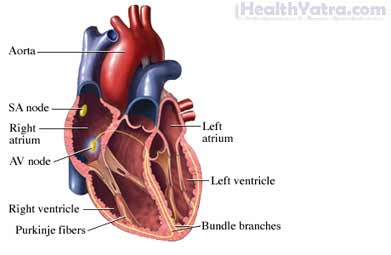সংজ্ঞা
Bradycardia is an abnormally slow heart rate. In adults, it is defined as a heart rate of less than 60 beats per minute. Different types of bradycardia are collectively referred to as bradyarrhythmias. They include:
- Sinus bradycardia—an unusually slow heartbeat due to heart disease, a reaction to medication, or harmless causes, such as excellent fitness or deep relaxation
- Sick sinus syndrome—an unusually slow heartbeat due to a malfunction of the sinoatrial node, which is the heart’s natural pacemaker
- Heart block (atrioventricular block or AV block)—an unusually slow heartbeat due to a slowing or blocking of electrical impulses in the heart’s conduction system

কারণসমূহ
Bradycardia may be caused by:
- Normal responses to:
- Deep relaxation
- Being in excellent physical shape
- The heart’s natural pacemaker developing an abnormal rate or rhythm
- The normal electrical conduction pathway being interrupted
- হার্টের আরেকটি অংশ পেসমেকার হিসেবে নিচ্ছে
ঝুঁকির কারণ
Risk factors that increase your chance of getting bradycardia include:
- বয়স বেড়েছে
- হাইপোথাইরয়েডিজম
- Taking certain medications used to treat:
- উচ্চ্ রক্তচাপ
- আলঝেইমার রোগ
- হৃদরোগ
- Heart failure and arrhythmias
- Exposure to certain toxins
- Cardiac disease, such as:
- হৃদপিন্ডে হঠাৎ আক্রমণ
- Wearing out of the heart’s conduction system
- কনজেস্টিভ হার্ট ফেইলিউর
- Heart valve failure
- Heart conditions that are inherited or present at birth
- Electrolyte imbalances
- নিদ্রাহীনতা
- Lupus or other collagen vascular diseases (rare)
- Head injuries
- হাইপোথার্মিয়া
- হাইপোগ্লাইসেমিয়া
- Infectious diseases, such as:
- ডিপথেরিয়া
- বাতজ্বর
- Viral myocarditis
- লাইম রোগ
- Chagas disease
লক্ষণ
Some types of bradycardia produce no symptoms. Others may cause noticeable symptoms, such as:
- Fainting or loss of consciousness
- Dizziness or light-headedness
- দুর্বলতা
- Mild fatigue
- Irregular heart beat
- নিঃশ্বাসের দুর্বলতা
- বুক ব্যাথা
Serious forms of bradycardia, such as complete heart block, are medical emergencies. They can lead to loss of consciousness or sudden cardiac arrest.
রোগ নির্ণয়
The doctor will ask about your symptoms and medical history. A physical exam will be done. Your heart will be examined with a stethoscope.
- Your doctor may need you to have blood tests. These tests will look for problems that may explain the bradycardia.
- Your doctor may need to test your heart function. This can be done with:
- ইলেক্ট্রোকার্ডিওগ্রাম
- ইকোকার্ডিওগ্রাম
- A portable, continuous heart rhythm monitor that you wear as you perform normal daily activities
- ব্যায়াম স্ট্রেস পরীক্ষা
- পারমাণবিক স্ক্যানিং
- হৃৎপিণ্ডে এনজিওগ্রাফি
চিকিৎসা
Treatment may not be required if you do not have cardiac symptoms and conditions. Your doctor may choose to monitor your heart rate and rhythm instead.
চিকিত্সা অন্তর্ভুক্ত হতে পারে:
- Stopping any medications that slow the heart rate
- Diagnosing and treating any underlying conditions
- Medication to temporarily increase your heart rate
- An artificial pacemaker to establish and maintain a normal heart rhythm
প্রতিরোধ
To help prevent bradycardia:
- Treat conditions that might lead to bradycardia.
- Carefully follow your doctor’s directions when using medications, especially those that can cause bradycardia.
- Check with your physician or pharmacist before using any over-the-counter medication or natural supplement. Make sure it does not interact with your other medications.
- Follow general advice for preventing heart disease, including:
- একটি স্বাস্থ্যকর ওজন বজায় রাখা.
- Consult with your doctor about a safe exercise program.
- ধূমপান এড়িয়ে চলুন।
- Eat a healthy diet that is low in saturated fat and rich in whole grains, fruits, and vegetables.
- Treat your high blood pressure and/or diabetes.
- Treat your high cholesterol or triglycerides.
